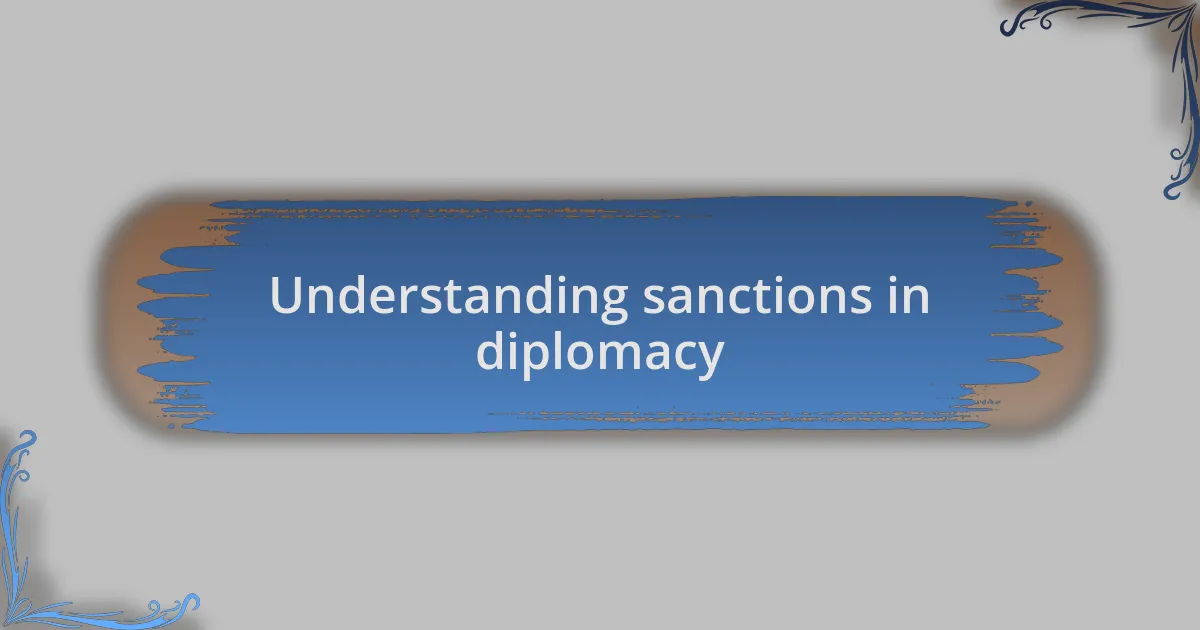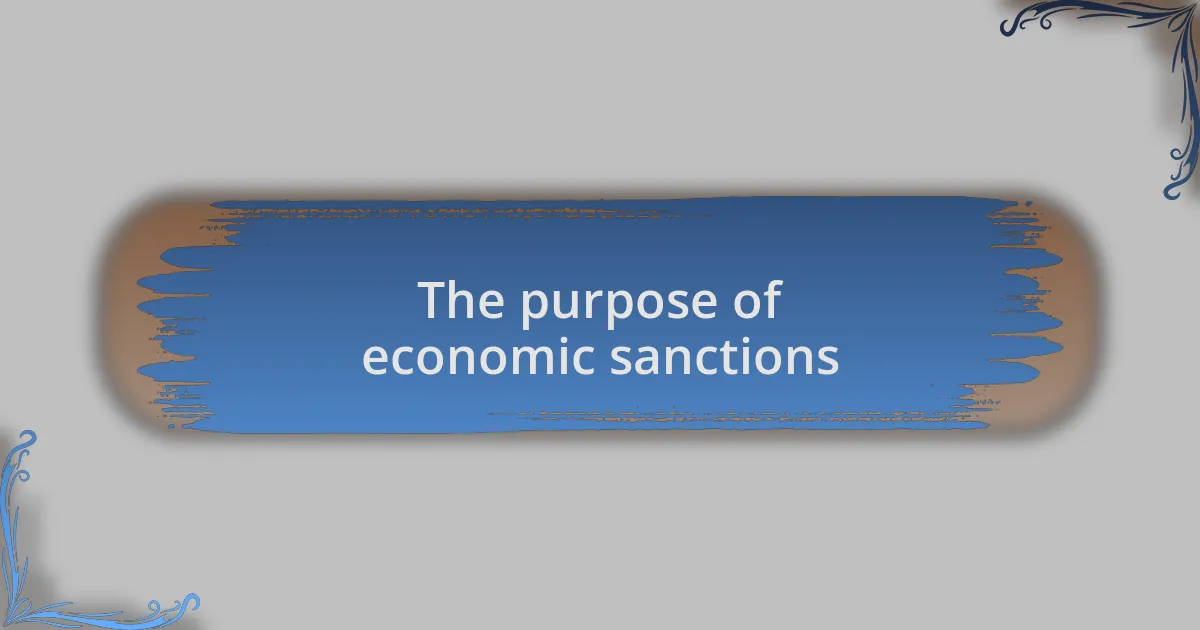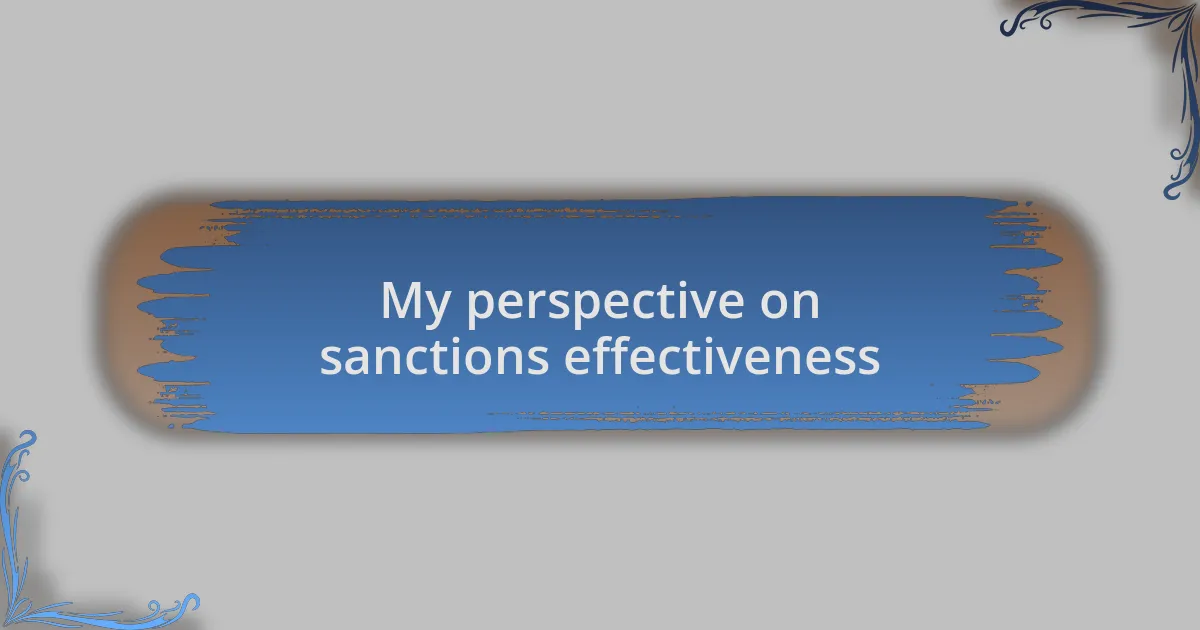Key takeaways:
- Sanctions aim to change a nation’s behavior without military action, but their effectiveness often depends on the target country’s leadership and international support.
- Economic sanctions can unintentionally harm innocent civilians and sometimes deepen national divides instead of promoting positive change.
- Historical examples, like sanctions on Cuba and Iraq, illustrate how sanctions can lead to prolonged suffering rather than achieving intended diplomatic goals.
- Long-term effects of sanctions are uncertain; engagement may be a more effective approach for fostering meaningful change than ongoing economic pressures.

Understanding sanctions in diplomacy
Sanctions are a powerful tool in the realm of diplomacy, often utilized to compel a nation to change its behavior without resorting to military action. I remember when discussing sanctions with a colleague, we both felt a mix of hope and skepticism—can simply cutting off trade really alter a government’s course? The reality is complex; while sanctions can indeed weaken a nation’s economy, their effectiveness often hinges on the resilience of the target country’s leadership and the solidarity of the international community.
What fascinates me is the human dimension behind sanctions. They aren’t just political moves; they impact real lives. I once spoke with a family from a country under heavy sanctions, and the stories they shared about struggle and resilience struck me deeply. It made me question, do we sometimes overlook the genuine human costs of these diplomatic decisions?
Despite their potential to bring about change, sanctions can also lead to unintended consequences, fostering resentment and hardship among innocent civilians. Reflecting on this, I often wonder if a more nuanced approach—combining dialogue with economic pressure—might yield better results in changing behaviors while minimizing suffering.

The purpose of economic sanctions
Economic sanctions aim to pressure nations into changing undesirable behaviors by limiting their access to resources and markets. I’ve often witnessed how these measures can serve as a wake-up call for governments, forcing them to reevaluate their actions. However, one has to ask: are these shifts in behavior truly genuine, or merely a reaction to the pressure applied?
One striking example comes to mind when I read about the sanctions placed on South Africa during the apartheid era. The isolation seemed to rally not only the government but also the general population against the world. It raised an essential question for me—how do we ensure that the sanctions target the decision-makers instead of the innocent citizens who simply want to live their lives?
I frequently reflect on the balance that sanctions attempt to achieve between encouraging a regime change and punishing civilians. It strikes me that while they can galvanize support for democracy and human rights movements, they risk deepening divides and causing unforeseen strife. Understanding this delicate balance makes me wonder: is there a better way to combine economic measures with diplomatic efforts for lasting change?

Historical examples of sanctions
One historical example that stands out is the United States’ sanctions against Cuba during the early 1960s. These measures were intended to curb the influence of Fidel Castro’s regime but ended up isolating an entire nation instead. I can’t help but think about the everyday Cubans who bore the brunt of this economic hardship—how could a policy meant to instigate change produce such prolonged suffering?
Another notable instance is the sanctions imposed on Iraq in the 1990s following the Gulf War. While these sanctions aimed to pressure Saddam Hussein to disarm and comply with international demands, the impact on the Iraqi population was devastating. Reflecting on this, I wonder: did these measures truly achieve their intended goals, or did they create a generation of animosity and resentment that would last long after the sanctions were lifted?
More recently, the sanctions against Iran have drawn attention. Aimed at curtailing its nuclear program, these sanctions sparked debates about their effectiveness. It’s fascinating to consider how public opinion shifts in countries like Iran, as citizens grapple with the repercussions of decisions made far away. Are they spurring diplomatic conversations, or further entrenching nationalistic sentiments against perceived foreign interference?

Pros and cons of sanctions
Sanctions can serve as a powerful tool for enforcing international norms and expressing disapproval of a nation’s actions. For example, when I reflect on the sanctions against South Africa during the apartheid era, it’s clear that these measures played a role in galvanizing public support for change. Would the global community have been as motivated without that economic pressure?
On the flip side, one can’t ignore the suffering that sanctions can inflict on innocent civilians. I remember conversations I had with friends who lived in countries under sanctions; they often shared stories about daily struggles for basic needs due to the restrictions imposed by foreign powers. How can we justify policies that punish whole populations, particularly when they often perpetuate the very regimes they seek to undermine?
Furthermore, while sanctions might appear to compel compliance, they can sometimes lead to unintended consequences, such as strengthening the resolve of the targeted government. In my experience, I’ve observed how some leaders manipulate sanctions to rally nationalistic sentiments, creating a narrative of victimization. Isn’t it perplexing to think that measures designed to promote peace could sometimes deepen divisions instead?

My perspective on sanctions effectiveness
Sanctions often seem straightforward, but their effectiveness can be perplexing. I remember discussing the impact of economic sanctions with a professor who emphasized that while they aim to provoke change, they can sometimes create a hardened resistance. It makes me wonder—if the goal is to promote compliance, why do we often see the opposite effect?
From my observations, sanctions can backfire by uniting a population against perceived external threats. I think about a colleague who shared her experiences during sanctions in her home country. Instead of leading to the desired reform, the government’s narratives of defiance led to a surge in national pride. How can we reconcile the intent behind sanctions with the reality of their impact on governance and society?
Ultimately, the long-term effects of sanctions remain ambiguous. I’ve talked to activists who believe that while short-term pressure might achieve some results, sustained change often requires engagement rather than confrontation. Isn’t it critical to ask ourselves if sanctions are truly the best method for fostering the kind of diplomacy that leads to lasting solutions?